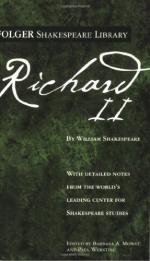|
This section contains 6,927 words (approx. 24 pages at 300 words per page) |

|
SOURCE: Kurtz, Martha A. “‘Mock Not’: The Problem of Laughter in Richard II.” University of Toronto Quarterly 65, no. 4 (fall 1996): 584-99.
In the following essay, Kurtz discusses how the element of laughter corresponds to the personalities of Richard and Bolingbroke. According to the critic, Richard's laughter, laced with arrogant elitism and mockery, signifies an aristocratic insecurity which culminates in his deposition; by contrast, Bolingbroke embraces the carnivalesque, popular laughter of the common man to establish political order after usurping the crown.
Richard II's fall from power in Shakespeare's play has been attributed to many causes: the weakness of the king's ‘poetic’ temperament; the strength of his un-poetic determination to ‘affirm a policy of royal absolutism’; his un-Christian willingness to allow a trial by combat; his failure to allow the trial by combat to proceed; his excessive leniency to both friends and enemies; his complicity in his uncle's murder.1 Most...
|
This section contains 6,927 words (approx. 24 pages at 300 words per page) |

|


